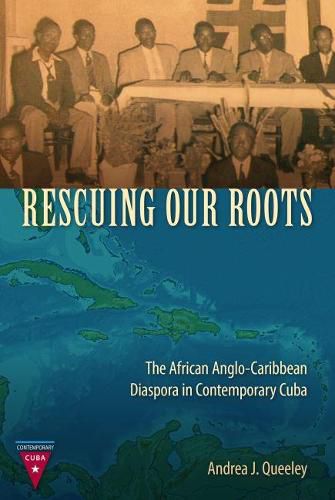Readings Newsletter
Become a Readings Member to make your shopping experience even easier.
Sign in or sign up for free!
You’re not far away from qualifying for FREE standard shipping within Australia
You’ve qualified for FREE standard shipping within Australia
The cart is loading…






This title is printed to order. This book may have been self-published. If so, we cannot guarantee the quality of the content. In the main most books will have gone through the editing process however some may not. We therefore suggest that you be aware of this before ordering this book. If in doubt check either the author or publisher’s details as we are unable to accept any returns unless they are faulty. Please contact us if you have any questions.
Provides invaluable insight into the histories and lives of Cubans who trace their origins to the Anglo-Caribbean. -Robert Whitney, author of State and Revolution in Cuba: Mass Mobilization and Political Change, 1920-1940
Adds a missing piece to the existing literature about the renewal of black activism in Cuba, all the while showing the links and fractures between pre- and post-1959 society. -Devyn Spence Benson, Louisiana State University
In the early twentieth century, laborers from the British West Indies immigrated to Cuba, attracted by employment opportunities. The Anglo-Caribbean communities flourished, but after 1959, many of their cultural institutions were dismantled: the revolution dictated that in the name of unity there would be no hyphenated Cubans. This book turns an ethnographic lens on their descendants who-during the Special Period in the 1990s-moved to rescue their roots by revitalizing their ethnic associations and reestablishing ties outside the island.
Based on Andrea J. Queeley’s fieldwork in Santiago and Guantanamo, Rescuing Our Roots looks at local and regional identity formations as well as racial politics in revolutionary Cuba. Queeley argues that, as the island experienced a resurgence in racism due in part to the emergence of the dual economy and the reliance on tourism, Anglo-Caribbean Cubans revitalized their communities and sought transnational connections not just in the hope of material support but also to challenge the association between blackness, inferiority, and immorality. Their desire for social mobility, political engagement, and a better economic situation operated alongside the fight for black respectability.
Unlike most studies of black Cubans, which focus on Afro-Cuban religion or popular culture, Queeley’s penetrating investigation offers a view of strategies and modes of black belonging that transcend ideological, temporal, and spatial boundaries.
$9.00 standard shipping within Australia
FREE standard shipping within Australia for orders over $100.00
Express & International shipping calculated at checkout
This title is printed to order. This book may have been self-published. If so, we cannot guarantee the quality of the content. In the main most books will have gone through the editing process however some may not. We therefore suggest that you be aware of this before ordering this book. If in doubt check either the author or publisher’s details as we are unable to accept any returns unless they are faulty. Please contact us if you have any questions.
Provides invaluable insight into the histories and lives of Cubans who trace their origins to the Anglo-Caribbean. -Robert Whitney, author of State and Revolution in Cuba: Mass Mobilization and Political Change, 1920-1940
Adds a missing piece to the existing literature about the renewal of black activism in Cuba, all the while showing the links and fractures between pre- and post-1959 society. -Devyn Spence Benson, Louisiana State University
In the early twentieth century, laborers from the British West Indies immigrated to Cuba, attracted by employment opportunities. The Anglo-Caribbean communities flourished, but after 1959, many of their cultural institutions were dismantled: the revolution dictated that in the name of unity there would be no hyphenated Cubans. This book turns an ethnographic lens on their descendants who-during the Special Period in the 1990s-moved to rescue their roots by revitalizing their ethnic associations and reestablishing ties outside the island.
Based on Andrea J. Queeley’s fieldwork in Santiago and Guantanamo, Rescuing Our Roots looks at local and regional identity formations as well as racial politics in revolutionary Cuba. Queeley argues that, as the island experienced a resurgence in racism due in part to the emergence of the dual economy and the reliance on tourism, Anglo-Caribbean Cubans revitalized their communities and sought transnational connections not just in the hope of material support but also to challenge the association between blackness, inferiority, and immorality. Their desire for social mobility, political engagement, and a better economic situation operated alongside the fight for black respectability.
Unlike most studies of black Cubans, which focus on Afro-Cuban religion or popular culture, Queeley’s penetrating investigation offers a view of strategies and modes of black belonging that transcend ideological, temporal, and spatial boundaries.